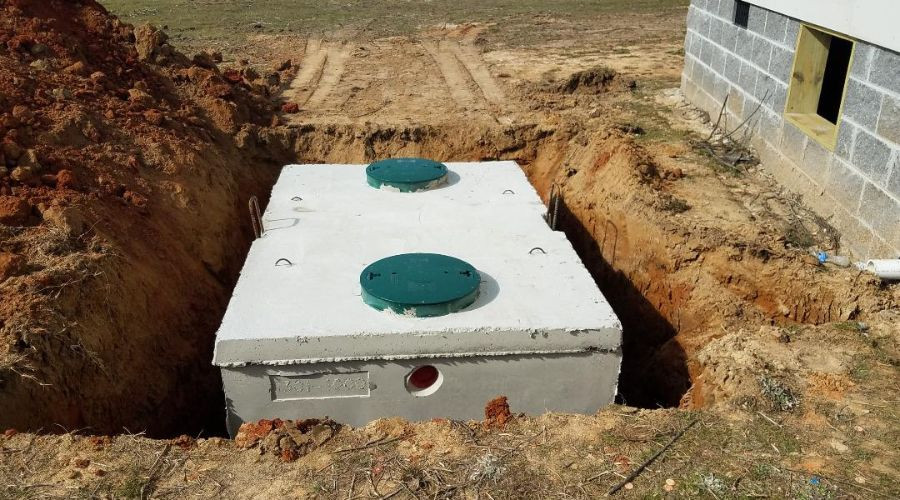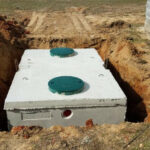
What is a Septic Tank?
A septic tank is essentially an underground wastewater disposal system used mostly in rural and residential settings. Technically, the septic tank is only one component of a complete septic system, which also includes a drain field. Drain fields are underground beds of sand, gravel, or other materials designed to filter wastewater.
Septic systems are an alternative to municipal sewer systems, which typically carry waste from an entire town or city to a central wastewater treatment facility. Although septic tanks are fairly common, most people don’t know much about them. But for anyone who has a septic system or is about to buy or build a home, it pays to have at least a basic understanding of them. So keep reading to learn how septic tanks work, how to keep them working properly, and some of their benefits!
How Does a Septic Tank Work?
As mentioned above, a typical septic system has two main components - the septic tank and the drain field. The septic tank is a large underground chamber usually made of concrete, fiberglass, or polyethylene. Wastewater from every drain in the home makes its way into the septic tank. Inside the tank, special bacteria digest the wastewater, effectively pretreating the wastewater to remove pollutants. Throughout the process, solids sink to the bottom and become “sludge,” while grease and oils float to the top and form “scum.” The liquid wastewater that remains after this separation and digestion process is known as effluent.
The effluent then leaves the septic tank and enters the drain field, a large, shallow pit filled with gravel or other porous materials. The effluent slowly seeps into the gravel through perforated pipes and is digested by more bacteria, further removing contaminants. From there, the effluent will filter through the soil, which filters it once again before it reaches the groundwater.
What Does Septic Tank Maintenance Entail?
 Although they are primarily self-sustaining, septic systems do require periodic maintenance to function correctly. The most important aspects of septic tank maintenance are inspecting the system and pumping the tank. In a professional septic inspection, a technician will thoroughly check the tank for leaks, inspect the drain field for evidence of flooding, and ensure the baffles (devices that prevent scum from entering the drain field) are working properly. This should be performed at least every three years.
Although they are primarily self-sustaining, septic systems do require periodic maintenance to function correctly. The most important aspects of septic tank maintenance are inspecting the system and pumping the tank. In a professional septic inspection, a technician will thoroughly check the tank for leaks, inspect the drain field for evidence of flooding, and ensure the baffles (devices that prevent scum from entering the drain field) are working properly. This should be performed at least every three years.
Another essential maintenance task is septic tank pumping (also called septic tank cleaning). It involves pumping the scum and sludge out of the tank. This should be done every two to five years, depending on the size of the tank and the volume of waste going into it. It’s important to note that these septic tank services should always be performed by a trained professional since they involve special equipment and hazardous material handling.
But there are a few septic system maintenance tasks that homeowners can do on their own. Homeowners should keep vehicles, trees, and excessive amounts of water away from the drain field. Homeowners should also avoid disposing of grease and food waste in drains and instead put them into the garbage can. Also, avoid harsh chemicals like the ones in liquid drain cleaners, which can harm septic bacteria.
Advantages of Septic Systems
 There are several septic tank benefits that homeowners should be aware of. For one thing, they are often more cost-effective than installing extensive sewer lines. Installing or replacing sewer lines can be expensive, particularly for extensive lengths of pipe. Most municipal wastewater authorities also charge monthly sewage disposal fees, which can add up over time.
There are several septic tank benefits that homeowners should be aware of. For one thing, they are often more cost-effective than installing extensive sewer lines. Installing or replacing sewer lines can be expensive, particularly for extensive lengths of pipe. Most municipal wastewater authorities also charge monthly sewage disposal fees, which can add up over time.
Another benefit of septic systems is that they are long-lasting, with a life expectancy of around 20-40 years, depending on the tank material and how well the system is maintained. In addition, septic systems are generally more environmentally friendly.
This is partly because they treat water through natural biological processes and do not pollute the groundwater with contaminants. It’s also because they incentivize homeowners to use less water (to avoid overwhelming the system) and are more self-sustaining, reducing the reliance on large wastewater treatment facilities that use massive amounts of energy. Septic systems are a great choice, especially for those who want to live in a more remote area or have a more self-contained and eco-friendly home!
About Honest Abe’s Home Services
Honest Abe's Home Services is a complete home service provider serving Osage Beach, MO, and the surrounding areas. They provide upfront pricing, 24-hour emergency services, and advanced technology. Call them today for septic services in Osage Beach, MO.
Distribution Links +
- www.htv10.tv
- www.wicz.com
- www.snntv.com
- central.newschannelnebraska.com
- metro.newschannelnebraska.com
- midplains.newschannelnebraska.com
- northeast.newschannelnebraska.com
- plattevalley.newschannelnebraska.com
- panhandle.newschannelnebraska.com
- www.wpgxfox28.com
- lifestyle.mykmlk.com
- www.wtnzfox43.com
- lifestyle.3wzfm.com
- lifestyle.southernsportstoday.com
- lifestyle.thepodcastpark.com
- lifestyle.680thefan.com
- lifestyle.xtra1063.com
- lifestyle.953hlf.com
- lifestyle.rewind1019.com
- lifestyle.us983.com
- lifestyle.countrylegends1059.com
- lifestyle.967wshv.com
- lifestyle.1045thedan.com
- www.yournewsnet.com
- michigan.yournewsnet.com
- midwest.yournewsnet.com
- northeast.yournewsnet.com
- southeast.yournewsnet.com
- southwest.yournewsnet.com
- lifestyle.earl983.com
- west.yournewsnet.com
- lifestyle.maverick1023.com
- lifestyle.magic979wtrg.com
- lifestyle.1077lakefm.com





